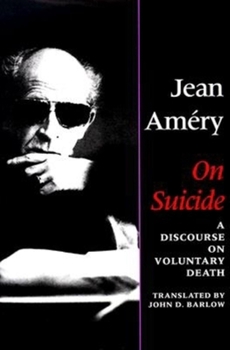On Suicide: A Discourse on Voluntary Death
" . . . a moving, deep series of insights into the suicide's world . . . " --Kirkus Reviews
Jean Am ry (Auschwitz survivor and author of At the Mind's Limits) thought of On Suicide as a continuation of the kind of reflections on mortality he had laid down in On Aging. But here he probes further and more deeply into the meaning of death and into the human capacity for suicide or voluntary death.
Format:Hardcover
Language:English
ISBN:0253335639
ISBN13:9780253335630
Release Date:July 1999
Publisher:Indiana University Press
Length:192 Pages
Weight:0.85 lbs.
Dimensions:0.8" x 5.7" x 8.6"
Customer Reviews
2 ratings
The Kirkus Review is not-so accurate. But still...
Published by Thriftbooks.com User , 19 years ago
It could be worse, like the hatchet job below that prompted me to write this. First things first: anyone who is pretentious/affectatious enough to quote Nietzsche solely in his original German- a quote that is all the more obscure for its reference to 'Seneca and his ilk,' (the title) and its borrowing of a Latin coin of phrase- has already demonstrated his bad faith. I'm talking about the next reviewer. You see; he's not assuming that you will posses a working knowledge of German so that you will catch his all-too-coy reference. He simply wants to intimidate you with his high and mighty linguistic flourishes. "I CAN QUOTE NIETZSCHE IN THE ORIGINAL AREN"T I SO FRIKKIN SMART NOW YOU HAVE TO SUBSCRIBE TO MY INTELLECTUAL OPINIONS!!! He seems to scream. He comes not to discuss but to brag and condescend- he doesn't give an accurate rendering of Amery's book, he merely reveals the depths of his own extremely beknighted 'Weltanshaaung.' Here is the translation of said piece, from "The Joyful Science," (a wonderful book and one deserving of a better reader) It is the 34th song, "They write and write their intolerably sagacious Larifari, As if it 'gaelt primum scribere, Deinde philosophari.' (meaning 'first to write then to philosophize.') IMHO, the statement applies far more readily to the reviewer employing it than the book he reviews. Yes, Amery attempted suicide before writing this and then ended up succeeding some time after. Yes, Amery does employ a pseudo-existentialist vocabulary in order to make sense of his predicament. But he has no pretense that he speaks for mankind. He simply dislikes the various ways in which society seeks to make sense/marginalize/cure the phenomenon of suicide, and he espouses a different tact, in understanding it. He believes that the act is one a person can approach and commit with dignity and clear-mindedness. Make what you will of that. It calls to mind the opening chapter of Camus, "The Myth of Sisyphus," which is, at heart, another mediation on suicide, albeit from a different perspective again. His suicide in no means destroys or stains his observations and ideas. I have all three of Amery's books, and I unhesitatingly recommend each one. I'm not planning on killing myself, and my feelings on the subject are ambivalent. Still, I find J. Amery to be refreshingly clear, immediate and concise. He avoids jargoneering and tendentiousness, and never stoops to pathos. He writes in a persuasive and at times subtly humorous fashion. He isn't trying to get the world to kill itself en masse, and he's not trying to get your child to put its head in an oven. He simply wants to discuss and examine, as objectively as possible (though he admits that it is not) the idea that life (under certain conditions) may not be worth living. This is one of the few books on suicide that actually had a great deal of profundity. Worth the read. The third reviewer is also spot-on... I would also recommend A. Alvarez' "The Savage God,"
how suicide actually feels...
Published by Thriftbooks.com User , 21 years ago
Finding myself an unwilling survivor of suicide in 1991, I resigned myself to making a more strenuous effort. At the same time, I began a rigorous study of the literature of suicide in order to gain some understanding of what I found happening to me. The situation was simply bizarre beyond words.Subsequently, I have plowed through mountains of "expert" opinion and sampled all the various available treatments with the unavoidable conclusion that no one can help me understand what is happening. And I really ought to finish my suicide before madness incapacitates me. The urgency is extreme.Here the author at least exposes the missteps of psychotherapy with regard to suicide in such a frank and compassionate way that I finally have some semblance of hope that I can make my peace with the problem. Here is a human who has thrust himself beyond the edge of life and was involuntarily thrust back into it. So he knows what he's talking about. And his manner of discussion is so soothing and articulate and artistic that it reintroduces some dignity into my own life that has been cast aside, even by myself, as a horrific failure. Yes, dignity at least appears to become resurrected as a possibility to me now.And the friendly talk here is infinitely satisfying on so many different intimately personal levels. The author's experience is one that comforts by way of confirming the unspeakable fact that we who long to die are NOT really mad. We would not REALLY want to die if the world were really a sane place. And he scratches a possibility of hope onto the surface of the world that says--Let those of us who know this feeling reach out in sane comfort to each other. No particular way...just some way. Not much sanity...just a little...just enough to get by on.And that's precisely what I'm doing with this review. I am bearing witness that this man knows how suicide feels...so that his words have substance and profound depth and comfort.




